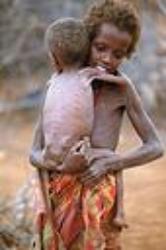


Al die opwinding, al die aandacht voor iemand die de grenzen wil sluiten voor de armen en wanhopigen. Iemand uit een werelddeel waar kinderen van honger sterven. Maar stervende kinderen zijn allang geen nieuws meer. De Amerikaanse journalist Norman Solomon schrijft: ' Corporate Media and Advocacy Journalism. We see this kind of news story now and again. Sometimes we try to imagine the people behind the numbers, the human realities underneath the surface abstractions. But overall, the responses testify to journalism’s failings -- and our own. “Poor nutrition contributes to the deaths of some 5.6 million children every year,” an Associated Press dispatch said early this month, citing new data from the U.N. Children’s Fund. And: “In its report, UNICEF said one of every four children under age 5, including 146 million children in the developing world, is underweight.” The future is bleak for many children who will be born in the next decade. As AP noted, “the world has fallen far short in efforts to reduce hunger by half before 2015.” Reading this news over a more-than-ample breakfast, I thought about the limitations of journalistic work that is often done with the best of intentions. Try as they might, reporters and editors don’t often go beyond the professional groove of the media workplace. Journalists routinely function as cogs in media machinery that processes tragedy as just another news commodity. Many people are troubled by the patterns of negative events around the world. And hunger is especially disturbing; in an era of prodigious affluence for some, the absence of basic nutrition for huge numbers of human beings is a basic moral obscenity. Across the spectrums of culture, faith and ideologies -- whether remedies might seem to lie in religious charity or governmental action -- heartfelt desire to reduce suffering is very common. News outlets are adept at producing vivid stories about misfortune. Those stories might be emotionally affecting or even politically mobilizing in terms of relief efforts. But the overarching matter of priorities is not apt to come into media focus. In general, corporate-employed journalists are not much more inclined to hammer at the skewed character of national and global priorities than corporate chieftains or government officials are. In a world where so much wealth and so much poverty coexist, the maintenance of a rough status quo depends on a sense of propriety that borders on -- and even intersects with -- moral if not legal criminality. The institutional realities of power may numb us to our own personal sense of the distinction between what is just and what is just not acceptable.' Lees verder: http://www.commondreams.org/views06/0516-35.htm




Geen opmerkingen:
Een reactie posten